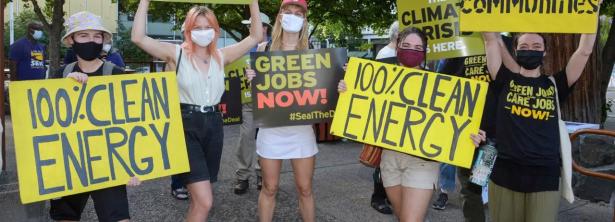Green groups in Oregon celebrated on Wednesday after NW Natural withdrew its application for approval to build a green hydrogen pilot program in Eugene, citing local uproar.
"This should be a lesson, not just for NW Natural but for all toxic polluters—the West Eugene community is not a sacrifice zone," said Lisa Arkin, executive director of Beyond Toxics, in a statement.
"Eugene residents will not be forced to be guinea pigs for experimental and dangerous technology that perpetrates fossil fuel infrastructure, environmental injustices, and more air toxics," Arkin added. "This project was absolutely unacceptable, and its withdrawal is a testament to the power of community opposition."
NW Natural's move came a few weeks after climate, health, and social justice groups, including Beyond Toxics, petitioned the Oregon Public Utility Commission to reject the proposal to install a multimillion-dollar electrolyzer to create hydrogen that would have been blended into gas and then piped into a working-class area in Eugene.
NW Natural is the state's largest gas utility, and as the Oregon Capital Chronicle noted last month, incorporating hydrogen could help the company work toward cutting planet-heating emissions in line with a 2020 executive order from Democratic Gov. Kate Brown.
However, the withdrawn project was also exploratory in nature. As NW Natural spokesperson Dave Santen said, "This initial project—the first in Oregon—will provide valuable learnings that will prepare for the deployment of clean hydrogen more broadly across the economy and sectors."
The Oregon Capital Chronicle reported that in addition to being costly—which meant that along with planning small rate hikes, the company was seeking government subsidies—the pilot project was under fire for its limited impact on emissions compared with other approaches:
By replacing 5% of the natural gas currently going to 2,500 customers in Eugene with green hydrogen, NW Natural would cut about 200 metric tons of carbon dioxide from being emitted per year, according to Santen.
That represents about 0.003% of the company's annual emissions, which were about 5.4 million metric tons in 2020, according to the most recent data from the Oregon Department of Environmental Quality.
The average American home and business that relies on fossil fuels for heating and cooking is responsible for about eight tons of carbon emissions each year, according to an analysis from the nonprofit research group Rocky Mountain Institute, headquartered in Colorado. If those homes and businesses were powered by renewable sources like solar and wind energy, their emissions would be about zero.
Switching 2,500 households in Eugene to renewable energy rather than blended natural gas would have the potential to cut about 20,000 tons of carbon dioxide from being emitted per year. That's 100 times the amount that would be cut by using NW Natural's hydrogen and natural gas blend.
"The law requires real decarbonization, not phony solutions that justify continued reliance on fossil fuels," Earthjustice attorney Jan Hasselman said Wednesday. "There may well be some role for hydrogen in a decarbonized future, but that role will not be pumping it into people's homes to burn in stoves and hot water heaters."
Hasselman and Carra Sahler of the Green Energy Institute represented the groups who challenged the project last month: Beyond Toxics, NAACP Eugene-Springfield, Springfield Eugene Tenant Association, Oregon Physicians for Social Responsibility, Sierra Club, and 350 Eugene.
"As our community transitions off of polluting fossil fuels, we don't have time for dangerous distractions like NW Natural's experimental hydrogen blending project," said Dylan Plummer, senior campaign representative at the Sierra Club. "We must invest in solutions that are safe and cost effective like heat pumps, which provide real benefits to Eugene residents."
Though campaigners welcomed the withdrawal as a win, NW Natural's Tuesday filing made clear that some version of the project could be revived after "more stakeholder outreach and engagement."
"By withdrawing its application," the filing states, "NW Natural is seeking to convey that it is willing to engage in stakeholder outreach without a predefined time limit that would have been included as part of a motion to suspend the procedural schedule, and that it is willing to consider changes to the project in light of such outreach, as well as potentially other factors, such as the Inflation Reduction Act, which was not passed when the project application was submitted."
While acknowledging the local community's concerns, the document also stresses that the company "continues to believe that hydrogen is an essential component of its decarbonization strategy, that hydrogen blends have been safely and reliably demonstrated in similar pilot projects in North America and Europe, and that it can be successfully used on NW Natural's system."
The document was filed just days before COP27, the United Nations climate summit set to kick off in Sharm El-Sheikh, Egypt this weekend.
During last year's conference in Glasgow, Scotland, hundreds of organizers warned against schemes pushed by polluters which "blithely rely on assumptions that carbon offsets, tree plantations, bioenergy, and dangerous distractions such as hydrogen and carbon capture and storage will somehow keep or take emissions out of the air after polluters have done their damage."
Jessica Corbett is a staff writer for Common Dreams.


Spread the word